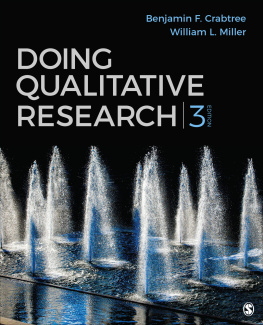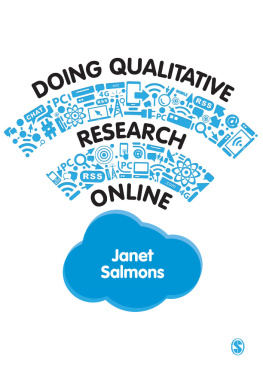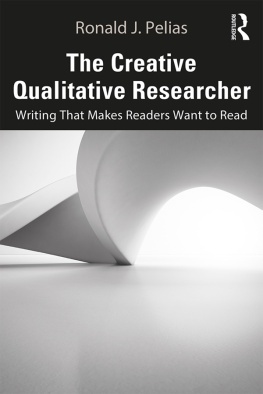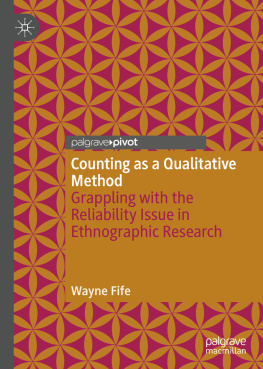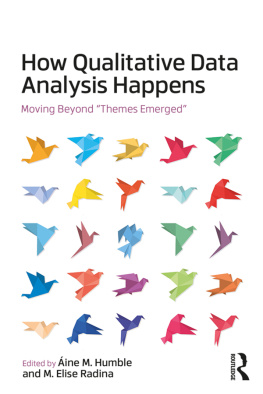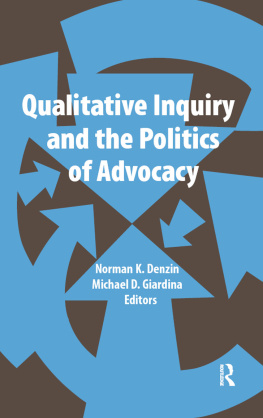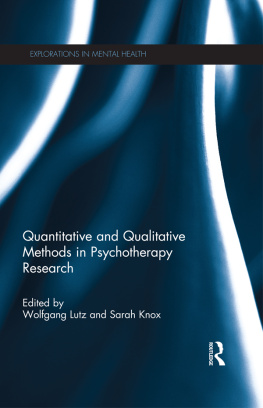
T HE C REATIVE Q UALITATIVE R ESEARCHER
The Creative Qualitative Researcher is designed to help readers see the range of possibilities of creative scholarship. The phrase creative qualitative researchers points toward scholars who call upon their literary skills to evoke the emotional and intellectual complexity of their subjects; who deploy their vulnerable, relational, and reflexive selves to expose and change problematic cultural practices; and who engage their embodied ideological and ethical sensibilities as researchers.
Part I introduces chapters on four qualitative methods: autoethnography, performative writing, narrative inquiry and poetic inquiry. Each of these four method chapters presents the method written in the style it features, provides writing prompts for exploring the chapters themes, and offers written examples of the method.
Part II, divided into four chapters, aims to develop creative qualitative research skills relevant to the methods discussed in Part I. Chapter 5 discusses empathy and ethics; Chapter 6 is a primer on creative writing; Chapter 7 identifies some alternative ideas for using the words of others; and Chapter 8 focuses on collaborative improvisation to compose scholarly work. Each of the chapters in Part II includes a large number of writing exercises, prompts and strategies to assist scholars in becoming better creative researchers.
By the end of the book, readers will know what creative research might entail and will have a clear understanding of the methods. Working with the various writing strategies, readers will see the potential of creative research and gain skills for its use.
Ronald J. Pelias works on the stage primarily as a director and on the page as a writer committed to non-traditional forms of scholarly representation. His most recent books are If the Truth Be Told: Accounts in Literary Forms (2016) and Writing Performance, Identity, and Everyday Life (2018).
First published 2019
by Routledge
2 Park Square, Milton Park, Abingdon, Oxon OX14 4RN
and by Routledge
52 Vanderbilt Avenue, New York, NY 10017
Routledge is an imprint of the Taylor & Francis Group, an informa business
2019 Ronald J. Pelias
The right of Ronald J. Pelias to be identified as author of this work has been asserted by him in accordance with sections 77 and 78 of the Copyright, Designs and Patents Act 1988.
All rights reserved. No part of this book may be reprinted or reproduced or utilised in any form or by any electronic, mechanical, or other means, now known or hereafter invented, including photocopying and recording, or in any information storage or retrieval system, without permission in writing from the publishers.
Trademark notice: Product or corporate names may be trademarks or registered trademarks, and are used only for identification and explanation without intent to infringe.
British Library Cataloguing in Publication Data
A catalogue record for this book is available from the British Library
Library of Congress Cataloging in Publication Data
A catalog record for this book has been requested
ISBN: 978-0-367-17547-4 (hbk)
ISBN: 978-0-367-17548-1 (pbk)
ISBN: 978-0-429-05738-0 (ebk)
Typeset in ITC Legacy Serif
by Apex CoVantage, LLC
I would to thank the following publishers for permission to reprint, some in revised form, the works listed below.
A CADEMIC J OURNALS
Sage Publishing
After Orlando. Qualitative Inquiry 23.7 (2017): 25758.
Archiving Father and Son. Qualitative Inquiry 18.2 (2012): 14448.
On Playing Cowboys and Indians: Early Lessons in Ethical Sense Making. Cultural StudiesCritical Methodologies 12.6 (2012): 47880.
Still Here, Writing, Trying to Be a Part of the Conversation. Cultural StudiesCritical Methodologies 22 (2017): 36465.
Routledge/Taylor & Francis
Performative Writing: The Ethics of Representation in Form and Body. In Norman K. Denzin and Michael D. Giardina (Eds.), Ethical futures in qualitative research: Decolonizing the politics of knowledge (Walnut Creek, CA: Left Coast Press, 2007): 18196.
University of California Press
On the Joy of Connections. Qualitative Communication Research 1.2 (2012): 16369.
Reading and Writing Research Located in the Literary. International Review of Qualitative Research 10.3 (2017): 26871.
L ITERARY J OURNALS
Rather and Naming. Brickplight (August 2017): https://sites.google.com/site/brickplight/archives/issue-7/ronald-j-pelias
Why Reading Poetry Is Unpleasant. Riddled with Arrows: A Literary Journal 2.2 (July 2018): n.p.
Skipping. Storgy Magazine (April 2018): https://storgy.com/?s=Ronald+J.+Pelias
I Knew. Bookends Review (January 2017): http://thebookendsreview.com/2017/01/30/i-knew/
1.
I wrote this book because I thought it might be of some use to people who are first encountering qualitative methods or who feel their creative research practices might benefit by reading another qualitative researchers account of the endeavor. My aim is to help readers see the range of possibilities of creative scholarship, a form of scholarship that I find has considerable affective and cognitive power. I use the phrase creative qualitative researchers to identify the scholars who call upon their literary skills to evoke the emotional and intellectual complexity of their subjects; who deploy their vulnerable, relational, and reflexive selves to expose and change problematic cultural practices; and who engage their embodied ideological and ethical sensibilities as researchers and cultural members to guide their scholarship. Thats the door I worked to open. Perhaps it would be more accurate to say Im walking through a door many other creative researchers have opened. You will meet many of those scholars in the chapters to come.
You will soon see that Im already attempting to write as a creative scholar. Im using this beginning, not only as an orientation to the book, but also to establish a feel for what you might find as you turn the pages. This prologue could also serve as a final summary of the primary qualitative methods (autoethnography, performative writing, narrative inquiry, and poetic inquiry) and writing strategies I discuss in the book. The rhetorical choice I made to start this way feels a bit risky to me. You may wish Id given a simple, straightforward account, or may think what Im writing here is misplaced, confusing, or pretentious. You, of course, get to decide if my writing has any value. Before going to the next section in this prologue, I should tell you that number 4 comes next. Thats another decision I made. Before long, youll understand what Im trying to do with my numbering code. I also might say that I changed the title of this introduction from Preface: An Author Begins to Play to Prologue: An Author Begins to Play. Prologue seems to me a better word choice since it carries stronger literary connotations than does Preface. I think these kinds of revisions matter, dont you?
4.
Beginnings
ride on the back of faith
give way to sweaty work, the daily grind
insert their fears at the conclusions end


